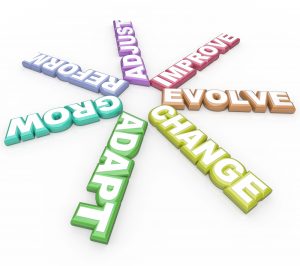This blog post picks up where the first half of this Q&A on How I/O and Clinical Psychology can Help Your Career left off. Dr. James Brazeau, C.Psych., a clinical psychologist, has graciously agreed to answer some questions.
Q. Can you describe what you do as a clinical psychologist? Is it much different from what Dr. Helen Ofosu does as an I/O psychologist?
A. I/O psychologists typically focus on issues related to the workplace, such as helping individuals and organizations find the best fit between the employee and role(s), and the employer. They are very skilled at identifying an individual’s strengths and competencies and matching them to an appropriate role and work environment.
In contrast, clinical psychologists work to assess and treat mental health concerns and/or help individuals build resiliency to manage the many stressors that life throws at us. Clinical psychologists are usually trained to identify mental health concerns (e.g., depression, anxiety, anger issues) and will link people to treatments that have been proven to work.
Q. Is there ever an overlap in expertise?
A. Sometimes there is an overlap between what I/O and clinical psychologists know and do. For example, I might see someone who is experiencing significant stress that is directly related to their work environment. I would work with these individuals to help them build coping skills or explore, from a therapeutic angle, what is making things so challenging for them in their lives.
Q. Would you say that the work you do with your clients is also about keeping them motivated?
A. Yes that’s a big part of it but, mainly, when people run into difficult life circumstances they usually have three choices:
- They can change the situation or environment around them.
- They can try to change something about themselves. For example, bad habits or poor decision-making.
- They can learn to accept their situation and/or adopt new strategies to deal with the situation and improve their outlook on the matter.
My work focuses on working with clients to identify which option, or a combination of options, that would be most beneficial to them. When it’s clear that they need to make changes to a work-related situation, Dr. Helen Ofosu has been a great resource.
Q. Let’s say you have a client who is being bullied or is stuck in a toxic workplace. As a consequence, they experience depression and don’t know how to leave the job without creating financial problems. Would you recommend an I/O psychologist with the right experience and approach?
A. In that particular instance, it would be a blend of what I do and what an I/O psychologist can provide. My expertise is in helping a client who is experiencing these problems to identify and cope with whatever negative emotions are coming up from the situation. These emotional responses could include stress, anxiety, or general unhappiness. It’s about giving them solid tools to use to manage those feelings and/or thoughts. For some, this alone can greatly reduce their work-related difficulties. However, for many individuals, the problem is the fit between themselves and their role and/or work environment. In these cases, I would definitely suggest they consult with an experienced I/O psychologist who can help the client search for other viable career options within, or outside, their current workplace.
 Q. I’d like to pose a similar question that I asked Dr. Helen Ofosu last week. Have general attitudes changed towards psychology? And, have you seen this generate more demand for your services from people who may not have sought help in the past?
Q. I’d like to pose a similar question that I asked Dr. Helen Ofosu last week. Have general attitudes changed towards psychology? And, have you seen this generate more demand for your services from people who may not have sought help in the past?
A. Historically, there has been a great deal of stigma associated with mental health concerns. I think there has been a lot of progress in the last decade, particularly through informational campaigns run by various organizations. That being said, we still have a very long way to go. People often say “The only thing certain in life is death and taxes” … but I would also add “human suffering” to that inevitability. At some point, we all struggle, often needlessly, and I hope that someday we can get to a place where this is widely accepted and people can seek help without feelings of shame or guilt.
Q. Keeping with the theme of overlapping practices in I/O and clinical psychology, do you think people may find it challenging to know which expert to seek for their career issues?
A. That is a very interesting point … because most people are not familiar with all the specializations within psychology. Many people see psychology in a broader and often stereotypical context. This is especially true if the person has never sought any psychological services before. My advice would be to narrow down some key issues that are causing problems in their day-to-day life. If it is more work-related concerns then I would recommend an I/O psychologist or someone skilled in working with career and/or workplace issues. And vice versa, if someone who sought their services revealed they were dealing with suicidal thoughts, or any other mental health concerns then seeking a qualified mental health professional, such as a clinical psychologist, would make sense.
Q. Do you think the future of psychology will feature psychologists from different sub-domains or specializations working together more cooperatively?
A. Collaboration is always important. I think it is essential to have access to an expert in the area in which you are struggling. I also think that professionals need to know the limits of their knowledge. We can’t all be experts in everything. I think one possible solution is to increase communication between career-related experts and mental health experts. People’s employment and their mental health are intimately linked. Most people spend a great deal of time in work-related environments. So, having skilled specialists share knowledge and insights with each other by referring clients to each other is a great way to stick to their area of expertise while still ensuring that the client is receiving the appropriate support for their professional and mental health needs.
Want to discuss any of this information? Please feel free to contact Dr. Helen by email, phone, or via direct message on Twitter, Facebook, or LinkedIn.
More than career coaching, it’s career psychology®.
I/O Advisory Services – Building Resilient Careers and Organizations.™
Easily share this article using any of the social media icons below.




